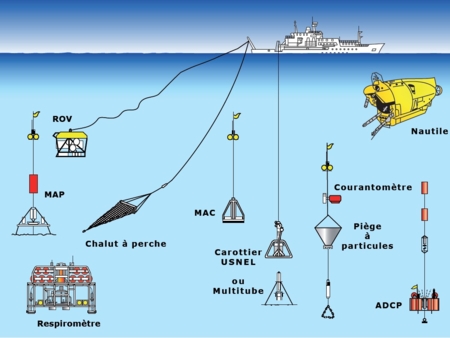PhD defence of Marc Cozannet
Physiological and Ecological Aspects of Methanomassiliicoccal in Terrestrial and Aquatic Environments
Please come to Marc Cozannet's PhD defence, it will take place in IUEM Amphi D, Tuesday 30th of March, at 13:30 pm
Abstract
Methanomassiliicoccales belong to the recently discovered methyl-dependent hydrogenotrophic methanogenic archaea. These archaea are divided into two phylogenetic clusters that reflect their adaptations to
digestive (‘host-associated’ cluster) or non-digestive (‘freeliving’ cluster) environments. So far, our knowledge about them is limited to studies focused on digestive environments. Thus, many questions remain about the lifestyle and adaptations of representatives of the ‘freeliving’ cluster in non-digestive ecosystems. The aim of this thesis was to improve our knowledge of the biology of Methanomassiliicoccales by investigating their distribution, diversity, abundance, as well as their metabolic and physiological potentials in non-digestive habitats. An original experimental strategy based on a combination of molecular and cultural approaches has been implemented in order to address these issues. Diversity and abundance
analyses were carried out on a panel of samples of various natures and origins revealed a low abundance and a low taxonomic diversity of Methanomassiliicoccales in the investigated environments. Cultural approaches have enabled growth and a significant enrichment of Methanomassiliicoccales from a microcosm incubated with freshwater sediments from which a metagenomic analysis enabled the reconstruction of a high-quality metagenome assembled genome (MAG)
corresponding to a new candidate species (Candidatus 'Methanomassiliicoccus armoricus MXMAG1'), belonging to the ‘free-living’ cluster. The analysis of this MAG showed that this MAG possesses set of genes involved in the response and regulation of various environmental stresses (ex.: pH, temperature, heavy metals, osmotic stress) and in methyl-dependent hydrogenotrophic methanogenesis. Finally, co-occurrence networks analyses based on diversity data revealed the cooccurrence of Methanomassiliicoccales with bacteria commonly detected in digestive environments and reported to form syntrophic relationships with methanogenic archaea.







